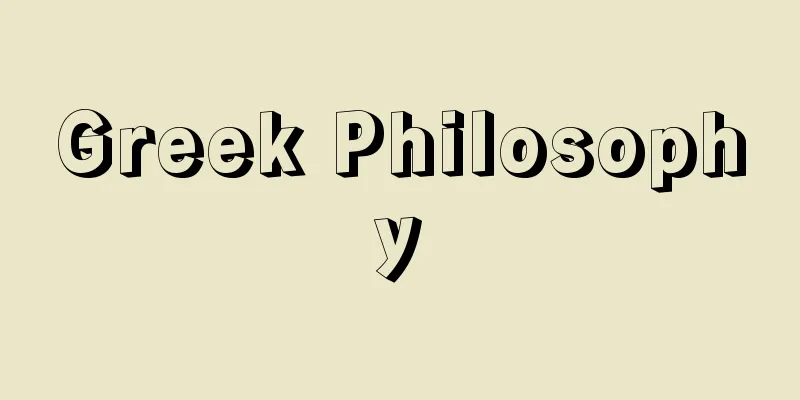Greek Philosophy

|
Just as the word philosophia, meaning "philosophy," was originally a Greek word meaning "love of wisdom," European philosophy has its origins in ancient Greek philosophy, which developed in the coastal areas of the Mediterranean Sea, mainly on the Greek mainland, from the 6th century BC to the 6th century AD. Although the Egyptian and Babylonian civilizations that preceded Greek civilization had already achieved a high level of development in technologies such as agriculture, navigation, and architecture, it was the Greeks who sought to understand the structure and mechanisms that make up technology, starting from the simplest element that makes it possible: stoicheion (principle). From this, surveying became geometry (geometria), astrology became astronomy (astronomia), and various academic disciplines were established. This is not born from a practical attitude of trying to put things to immediate use, but from an attitude of contemplation (theōriā) that enjoys looking at things in their own form and structure; here we see the Greek logos attitude. This theorial attitude of inquiring into the true nature of things in themselves (alētheia) gave rise to the path of philosophy (philosophy) that seeks to find the first principles of virtually everything that exists. The history of Greek philosophy can be divided into three periods: Preclassical, Classical, and Late Antiquity. However, with the exception of Plato, Aristotle, and Plotinus, most of the major works of philosophers from this period have been lost, and many sources have been reconstructed based on later traditions. [Nobuaki Kato] Preclassical (Pre-Socratic)Greek philosophical thought began in the 6th century BC in the colony of Ionia in Asia Minor, which had close contact with the advanced civilizations of Asia. The philosophers of this era sought the principle of existing things in a first principle from which beings that come into being and pass away are made up, and called this nature (physis in Greek, natura in Latin). Nature is the "birth" and "constitution" of things, on the basis of which the existence of "appearance" of things that come into being is based, when they appear clearly before our eyes as things that come into being. As a result, things ceased to be understood as "from the gods" based on a mysterious origin hidden from us (theological/mystical explanation), and came to be understood as something whose basis is revealed to us in its obvious existence (philosophical/rational explanation). Thales (c. 624-c. 546 BC) said that nature, the "formation" of all things, was "water," Anaximander (c. 610-c. 546 BC) said it was "infinite," and Anaximenes (c. 585-c. 528 BC) said it was "air." These are the "birth" of all things in the sense that all things are born from them. These people are called the Milesian School, since they were from Miletus. For the Pythagoreans, the "constitution" of all things is found in numbers, the formal principle that constitutes things. The world is a numerical harmony (= proportion, logos) that arises between opposing qualities. Heraclitus attempted to grasp beings, which come into being and disappear, in the entire process of this coming into being and disappearing. Therefore, what constitutes beings is at the same time their opposite, non-existence, and the world is understood as a dynamic harmony that exists between opposing opposites. This is the "logos (word, structure)" of the world. Parmenides of Elea (c. 515-c. 445 BC) stopped grasping existence as something that appears to the senses, as previous philosophers had done, and clarified that behind sensory phenomena, an unchanging and immutable existence is revealed to reason as its basis. This is the reality of existence, and sensory phenomena are merely illusions. Here, the thoughts of the first philosophers who sought "nature" as the "origin" of things that appear to the senses and that arise and disappear, that is, the people called natural scientists (physiologoi), came to a halt, and philosophy sought a new beginning. After Parmenides, Greek philosophy continued to decline and split into three schools: (1) the apologists (Zeno of Elea) who pursued Parmenides' logic and denied the existence of motion; (2) the pluralists (Empedocles, Anaxagoras, and others; Democritus' atomism) who, following Parmenides, accepted the immutability of fundamental existence and attempted to save the diversity of the natural world by pluralizing it and changing their interrelationships; and (3) the Sophists (Protagoras, Gorgias), who, independent of the tradition of natural science, understood and used all words in relation to human existence based on the tradition of rhetoric that places the function of words in persuasion (guiding the soul). [Nobuaki Kato] Classical Period (Athenian Philosophy)A new beginning in Greek philosophy was set by Socrates (469-399 BC). Socrates took up the issue of virtue and asked what makes a human being good, and the problem of philosophy shifted from nature to the issue of the basis of human beings and their actions. Socrates thought that asking this question was the most important thing for humans, and asked it to everyone he met, regardless of who was in the same city. The end result of this question was that neither the person being asked nor Socrates, the person asking the question, knew the answer. However, Socrates realized that humans do not yet know what is most important to them (good) (knowledge of ignorance), and he knew that in asking this question, there is something most good for humans, and he called this search philosophia (philosophy). It was a path of turning the soul around, turning back to the basis on which humans base themselves, through the awareness of their ignorance that they do not yet know it. Plato (427?-347 BC), a student of Socrates, believed that the true existence lies in what a person can see with the eyes of the soul through the soul's transformation, and called this idea. In contrast, what is outside the self and can be touched through the senses is like a shadow that is always born and always passing away, and is subject to change. Philosophy is the movement of the soul that turns from the visible world of the senses to the invisible world of ideas, and ideas are the basis that makes this transformation of the soul possible. Plato expressed this by making full use of his logical imagination and poetic imagination, as a grand ontological system regarding the composition of the entire real world and a majestic mythos regarding the soul that travels through this real world. However, philosophy does not originally aim to conceive a system, but rather to intuition of the ultimate. This ultimate knowledge is attained and retained, as it were, in a flash of light within each person's soul, through mutual dialogue between lovers of knowledge, after a long journey of wisdom. Plato's student Aristotle (384-322 BC) returned to the position of a natural scientist in that the phenomena of existence are given to sensory experience. He developed the logical theories from Parmenides to Plato in the form of a syllogism, and made it a methodology for investigating principles in various areas of nature. This is how the science of proof was established. The foundations of today's special sciences were laid by Aristotle. Ideas were transferred to the external world of reality, and became the forms (eidos) of things, the principles that cause the movement of natural things. Beings are formed when these forms act on intangible matter. However, the knowledge of the knower is not limited to the knowledge of individual areas of nature, but is directed to the knowledge of the ultimate principle that grounds all that exists. This is "God," and the knowledge of the knower, as well as all human actions, are ultimately located in and based on the contemplation of this God. Socrates' question about the ultimate ground of action is answered in this way by Aristotle, and in this way the systems of ethics and politics are constructed. [Nobuaki Kato] Late Antiquity (Hellenistic philosophy)After Alexander the Great (reigned 336-323 BC) took away the freedoms of Greek cities, the age entered an era of organization rather than creation, and reflection rather than fundamental contemplation. In an era when people who were not native Greeks competed to imitate the Greek way, there was a lot of revision, publication, annotation and commentary of the works of classical philosophers. But preservation always involves reflection. The philosophical principles developed in the classical age were organized and reflected upon during this period, and took on a transitional form that would guide the thought of the next generation. This was done first as a reflection on the principles of practice. Thrown out of the framework of the polis, each person sought within himself the principles of living. Various philosophical schools competed with each other by teaching the "art of living." The Stoics created strict ethics by thoroughly implementing Socrates' teachings on good, and Epicurus (342/341 BC - 271/270 BC), representing materialism, sought good only in pleasure. The Academy abandoned accurate knowledge and saw the essence of Plato's teachings in living simply through inquiry. All of these were one-sided emphasis on the principles of classical philosophy, but at the same time they were also reflections on ancient philosophy from the perspective of the principles of living. The same can be said of the Neoplatonic school that came after these other schools, a revival of Platonic philosophy and the final school of ancient philosophy, in which the principles of ancient philosophy were reflected upon and synthesized from the perspective of the soul's journey to ultimate knowledge or salvation, becoming a path that leads to Christianity as the knowledge of salvation. [Nobuaki Kato] "Iwanami Lecture Series on Philosophy 16: History of Philosophy I" (1968, Iwanami Shoten) WKC Guthrie A History of Greek Philosophy, vol. 1-6 (1962-1981, Cambridge Univ. Press) AH Armstrong The Cambridge History of Later Greek and Early Medieval Philosophy (1967, Cambridge Univ. Press) [References] | | | | | | [Chronology] | [Supplementary Material] |Source: Shogakukan Encyclopedia Nipponica About Encyclopedia Nipponica Information | Legend |
|
「哲学」を意味する語フィロソフィアーphilosophiaがもとは「愛知」を意味するギリシア語であったように、ヨーロッパ哲学は、紀元前6世紀から紀元後6世紀までギリシア本土を中心とする地中海の沿岸諸域に展開された古代ギリシア哲学にその淵源(えんげん)をもっている。ギリシア文明に先だつエジプトやバビロニアの文明において農耕、航海、建築などの技術はすでに高度の発展を遂げていたが、技術の成立する構造・仕組みを尋ね、これを成り立たしめているもっとも単純な要素stoicheion・原理archēから理解しようとしたのはギリシア人であった。ここに測量術は幾何学geometriaとなり、占星術は天文学astronomiaとなって、いろいろの学問が成立した。これは、事物をすぐに利用しようとする実用の態度ではなく、事物を事物がそれ自身でもっている形と成り立ちにおいて眺めることを楽しむ観照(テオーリアーtheōriā)の態度によって生まれることであり、ここにギリシア人のロゴスlogos的な態度がある。 事物のそれ自身の真実(アレーテイアalētheia)の姿を尋ねる、このテオーリアーの態度によって、およそ存在する限りのすべてのものについて、第一の原理を尋ねていく哲学(愛知)の道が生まれた。 ギリシア哲学の歴史は、前古典期、古典期、後期古代の3期に分けられるが、プラトン、アリストテレス、プロティノスを除いて、この時代の哲学者の主要な著作はほとんど失われているため、後代の伝承に基づいて再構成された資料が多い。 [加藤信朗] 前古典期(ソクラテス以前の哲学)ギリシアにおける哲学的思索は、先進文明国であるアジアの諸国との接触が密接であった小アジアのイオニア植民市において、前6世紀のころに始まった。この時代の哲学者は、存在する事物の原理を、生成し消滅する存在者がそこから成り立っている第一の原理に求め、これを自然(ギリシア語でフィシスphysis、ラテン語でナトゥラnatura)とよんだ。自然とは、生成する事物がそのように生成するものとして、われわれの目の前にありありと現れている場合に、その「現れ」としての存在がそれに基づいて成り立っている、事物の「生まれ」であり「成り立ち」である。これによって事物は、われわれに隠された神秘な由来に基づいて、「神々からのもの」として理解されること(神学的・神秘的説明)をやめ、われわれにとって明白な存在においてその根拠を開示されるもの(哲学的・合理的説明)となった。タレス(前624ころ―前546ころ)はこの万物の「成り立ち」である自然を「水」であるとし、アナクシマンドロス(前610ころ―前546ころ)は「無限なもの」、アナクシメネス(前585ころ―前528ころ)は「空気」とした。これらは、万物がそこから生まれ出るという意味で万物の「生まれ」なのであった。 これらの人々はミレトスの人なので、ミレトス派とよばれる。ピタゴラス派では、万物の「成り立ち」は事物を構成する形式的な原理である数に求められる。世界は相反する諸性質の間に生まれる数的な調和(=比例、ロゴス)である。ヘラクレイトスは、生成し消滅する存在者をその生成し消滅する過程の全体においてとらえようとした。それゆえ、存在者を成り立たせるものは同時にその反対の非存在でもあり、世界は相拮抗(きっこう)する相反者の間に成り立つ動的な調和としてとらえられる。これが世界の「ロゴス(ことば、構造)」である。 エレアのパルメニデス(前515ころ―前445ころ)は、これまでの哲学者のように存在を感覚において現象するものとして把握するのをやめ、感覚的な現象の背後にその根拠として不変不動な存在が理性に対して示現していることを明らかにした。これこそが存在の真実性であり、感覚的現象は虚像にすぎない。ここに、感覚に現象する生成・消滅する事物の「成り立ち」としての「自然」を求めた最初の哲学者たち、すなわち自然学者(フィシオロゴイphysiologoi)とよばれる人々の思索は頓挫(とんざ)し、哲学は新たな端緒を求める。 パルメニデス以後、ギリシアの哲学は、(1)パルメニデスの論理を追究し、運動の存在を否定した弁証論者(エレアのゼノン)、(2)パルメニデスに従い、根元存在の不変性を認めたうえで、これを多元化することによって、その相互関係の変化によって自然世界の多様性を救おうとした多元論者(エンペドクレス、アナクサゴラスたち。デモクリトスの原子論)、(3)自然学の伝統とは関係なく、ことばの機能を説得(魂の誘導)に置く弁論術の伝統に基づき、すべてのことばを人間存在に関係づけて理解し用いたソフィスト(プロタゴラス、ゴルギアス)、の3派に分かれ、低迷を続けた。 [加藤信朗] 古典期(アテネ時代の哲学)ギリシア哲学の新しい端緒はソクラテス(前469―前399)によって置かれた。ソクラテスは徳の問題を取り上げ、人間が善くなるのは何によってかを問い、ここに哲学の問題は、自然から人間と行為の根拠の問題に移る。ソクラテスは、このことを問うことに人間にとってもっともたいせつなことがあると考え、同じ市の人のだれかれとなく、行き会った人ごとにこれを尋ねた。この問いの行き着く帰結は、いつも、問われている当の人も、問うているソクラテスも、その答えを知らないということであった。しかし、人間が自分にとってもっともたいせつなこと(善)をまだ知らないということを悟り(無知の知)、これを尋ねることのうちに、人間にとってもっとも善いことがあるとソクラテスは知り、この探求を愛知(フィロソフィアー、哲学)とよんだ。それは、人間が自己を根拠づけている根拠へと、これをまだ知らないという無知の自覚を介して、向き直っていく魂の転回の道であった。 ソクラテスの弟子プラトン(前427?―前347)は、魂の転回によって、人が魂の目をもって内に見うるものにこそ真実在があると考え、これをイデアideaとよんだ。これに反して、自己の外に、感覚を通じて触れうるものは、いつも生まれてくるとともに、いつも過ぎ去っていくもの、流動変化を免れない影のようなものである。見える感覚界から見えないイデアの世界に転向していく魂の動きが愛知(哲学)であり、イデアはこの魂の転回を可能ならしめる根拠である。プラトンはこれを論理的な構想力と詩的な想像力を駆使して、全実在界の構成に関する壮大な存在論の体系と、この実在界を遍歴する魂に関する雄渾(ゆうこん)なミュートスmythosとして表現した。しかし、愛知は、本来、体系の構想を目ざさず、究極なるものの直観に向かう。この究極知は、愛知者が相互に交わす問答を通じて、愛知の長い道行きののち、各自の魂の内に、いわば飛び火のようにして得られ、保たれるものである。 プラトンの弟子アリストテレス(前384―前322)は、存在の現象が感覚的経験に与えられるとする点で、自然学者の立場に復帰した。そして、パルメニデスからプラトンまでの論理説を三段論法という形式として展開し、それを自然の諸領域における原理究明の方法論とした。こうして成立する学問が論証学である。今日の特殊科学の基礎はアリストテレスの置いたものである。イデアは外なる実在界の内に移し置かれ、自然物の運動を引き起こす原理としての事物の形相(エイドスeidos)となった。存在者は無形の素材にこの形相が働きかけて形成される。 しかし愛知者の究知は自然の個々の領域の認識にとどまらず、すべて存在するものを根拠づけている究極の原理の認識に向けられる。これは「神」であり、愛知者の愛知も、また人間のすべての行為も究極においてはこの神の観照に定位され、これに根拠づけられているものである。行為の究極根拠を問うソクラテスの問いは、アリストテレスではこのような形で答えられ、このような形で倫理学と政治学の体系が構成される。 [加藤信朗] 後期古代(ヘレニズム時代の哲学)アレクサンドロス大王(在位前336~前323)によりギリシアの都市の自由が奪われてから、時代は、創造よりは整理、根源的思索よりは反省の時代に入った。生粋(きっすい)のギリシア人ではない人々が競ってギリシア風を模倣した時代には、古典時代の哲学者の著書の校訂、出版や注釈、解説が盛んに行われた。しかし保存はいつも反省を伴う。古典時代に展開された哲学の原理は、この時代に整理され、反省を加えられ、次代の思想を導く過渡的な形態をとった。 これは、まず、実践の原理の反省としてなされる。ポリスの枠の外に投げ出された人間は、各人、自己の内に生きるための原理を求めた。種々の哲学派は「生きる術」を教えて互いに覇を競った。ストア学派は、ソクラテスの善の教えを徹底することによって厳格主義の倫理をつくり、エピクロス(前342/341―前271/270)は唯物論を代表して快楽にのみ善を求めた。アカデメイア学派は確かな認識を断念して、ただ探究の内に生きることのなかにプラトンの教えの真髄をみた。これらはすべて古典哲学の原理の一面的な強調であるが、同時にそれは、生きる原理という観点からする古代哲学の反省でもあった。このことは、これらの諸派ののちに、プラトン哲学の再興として、古代哲学の最後を飾る新プラトン学派についても同じくいえることであり、ここでは古代哲学の諸原理が、究極知に至る魂の道行き、または救済という観点で反省、総合され、救済の知としてのキリスト教へと導く道となっている。 [加藤信朗] 『『岩波講座 哲学16 哲学の歴史Ⅰ』(1968・岩波書店)』▽『W. K. C. GuthrieA History of Greek Philosophy, vol.1~6 (1962~1981, Cambridge Univ. Press)』▽『A. H. ArmstrongThe Cambridge History of Later Greek and Early Medieval Philosophy (1967, Cambridge Univ. Press)』 [参照項目] | | | | | | [年表] | [補完資料] |出典 小学館 日本大百科全書(ニッポニカ)日本大百科全書(ニッポニカ)について 情報 | 凡例 |
Recommend
Buying and Selling - Bye Bye
A contract is established when one party (the sel...
Mount Bandai in Aizu
A folk song from the Aizu region of Fukushima Pre...
Red cornetfish - Red cornetfish (English spelling)
A marine fish belonging to the family Cornetidae ...
Mediterranean anemia
…It was once thought to be limited to the Mediter...
Sweet clothing - Kan no onzo
…The front and back hems are joined by brocade, s...
Qmeter - Q meter
This is a measuring instrument that measures the q...
Artemia - Brine shrimp
A small aquatic animal belonging to the family Ar...
Invincible
After World War II, no country could possess a mo...
American maple - American maple
…(4) Red maple A. pycnanthum K. Koch (illustratio...
Otama [village] - Otama
A village in Adachi County, central Fukushima Pref...
South-sea myrtle
…In Japan, it is a flowering tree of the Myrtacea...
Hu-lan yu (Hu-lan yü)
A name combining the "Hu Weiyong Prison"...
Yokkaichi asthma - Yokkaichi asthma
It is one of the most common pollution-related di...
Sandmeyer reaction - Sandmeyer reaction
A reaction in which the diazo group of an aromatic...
MNR (Congo) - MNR
...Masamba Debba abandoned the pro-Western and pr...









